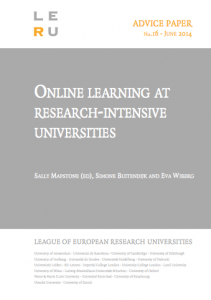Online learning at research-intensive universities Part 1
By Clive Young, on 9 February 2015
One conspicuous aspect of the advance of online learning in higher education has been the leading role of research-intensive universities (RIUs).
Blended learning; lecture capture and media use; online and peer marking; exercises, online discussion and quizzes in the VLE. Once the preserve only of e-learning enthusiasts such approaches have become unexpectedly mainstream. Many RIUs continue to be active in the MOOC phenomenon, due in part to the purposefully ‘elitist’ recruitment of partners by the main platform providers. Others focus more on SPOCs (small private online courses) for CPD and distance learning. Online learning seems to have been an opportunity for RUIs to publicly refocus or restate a commitment to innovation in teaching as well as research.
Last summer the League of European Research Universities (LERU) published an excellent hype-free report Online learning at research-intensive universities and the group met last week to discuss its finding and impact. LERU is an invitation-only members association of 21 RIUs of which UCL is an active member.
The paper had recognised that the technology associated with online learning, its “capacity to communicate knowledge widely and quickly and its capacity for innovation and creativity” often resonated with a RUIs’ research mission, increasingly measured by dissemination and impact. The global outreach potential of MOOCs, open resources and approaches, and SPOCs they considered irrefutable for both teaching and research.
The paper recommended that universities assess strategically (e.g. by scenario planning) the extent to which they wish their existing on-campus learning experiences to involve online delivery and digital materials and how much to extend their online learning opportunities to learners or co-enquirers outside their university.
Such an approach would have to consider the extent to which universities wish to work collaboratively with other institutions, or with commercial partners, how to sustain investments in financial and human capital and of course identify the reputational advantages and risks for their institution’s brand.
The follow-up LERU seminar last will be discussed further in my next post.
 Close
Close


